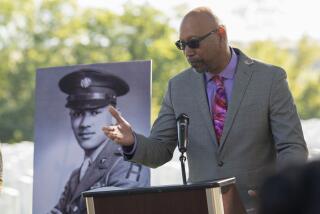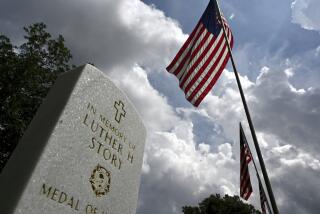WWII veteran, once believed dead, receives medal
- Share via
Reporting from Miami — Cornelius Reagan, shot down over Indonesia during World War II, survived on his wits, tropical fruit and the raw flesh of animals.
Then Japanese forces found him and imprisoned him in internment camps for more than three years.
This week, the Veterans Affairs Medical Center in Miami honored his sacrifice by awarding the U.S. Army Air Corps second lieutenant, now 95, the Prisoner of War Medal — 65 years after he was released by the Japanese weighing just 92 pounds.
“I thought to myself, if I can just survive, I’ll be able to get home,” a beaming Reagan said at the ceremony, as he stood proudly with his new medal pinned to the lapel of his gray suit.
To gentle laughter, Reagan said he has been recognized before, with a presidential citation and a Purple Heart for being killed in action. Reagan had been missing so long during the war that the military presumed he had been killed, and told his mother he was dead.
“We’re here to set the record straight,” said Japhet Rivera, the VA’s associate director. “After so many years, he’s here to receive the medal he earned.”
Reagan, an only child who was born in Lexington, Ky., joined the Army Air Corps cadets in 1940, after attending the University of Kentucky.
A plane he was piloting solo was shot down over the island of Java on March 1, 1942. He landed in a rice paddy on a mountain.
Traveling by night in a stolen boat, Reagan survived on tropical fruit, roots and animals that he ate raw because he could not light a fire, he told the Miami Herald in 2002.
“I thought maybe if I got to the ocean, I could maybe steal a boat and get to Australia,” he said.
Eventually, islanders found Reagan and turned him over to the Japanese. To hide that he was an American soldier, Reagan told his captors he was a war correspondent from Ireland, a country that remained neutral in the conflict.
As a prisoner of war, Reagan was shuffled among several internment camps, slept on dirt floors and was subjected to severe dietary restrictions. He was also put on burial detail.
At one camp, he was directed to read propaganda over a public address system. When he refused he was severely beaten, charged with sabotage and court-martialed. He was found guilty and sentenced to a life of hard labor.
Reagan, who learned to speak Japanese and Dutch during his captivity, said he felt lucky. Many of the 55 or so other prisoners on trial that day were given an immediate death sentence.
Soon after his sentencing, Reagan was transferred to a political prison on the north coast of Java. He was tortured, he said, including having bamboo sticks placed under his fingernails and being forced to drink water “until you almost explode.”
Reagan was finally released from confinement and rescued by the British military in September 1945 as the war ended. Reagan stayed in the military and retired to Miami with his family in 1961.
“My bedtime stories were his escapades in the island of Java, in installments, evading the Japanese,” said Patrick Reagan, 63, the elder of the veteran’s two sons.
But Cornelius Reagan says he is still haunted by memories of his time as a war prisoner.
“Many times,” he said, “I have nightmares of the mental treatment that I had.”
He receives assistance at the VA and has told his story to military groups and high school students.
“This is an incredible story, sir,” Rivera, the VA associate director, told Reagan. “And probably one that would be great for a movie.”
More to Read
Sign up for Essential California
The most important California stories and recommendations in your inbox every morning.
You may occasionally receive promotional content from the Los Angeles Times.













